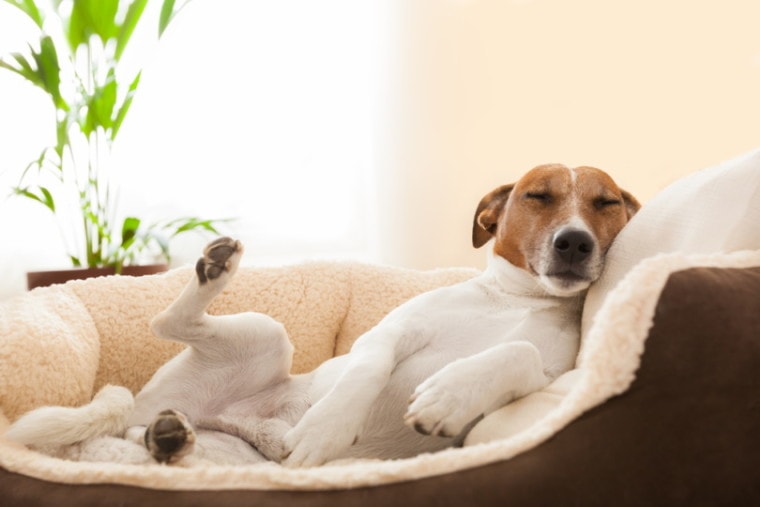
Click to Skip Ahead
After dogs are potty trained and fixed, they typically have fewer accidents indoors, and most pups wait until they’re able to go outdoors to urinate. However, a medical condition or behavioral issue can cause your dog to pee in its sleep. Wetting the bed during sleeping hours shows that the animal can no longer control its bladder. Treating a urinary problem is difficult when you do not understand the cause, and the only way to help your pet is by a visit to the veterinarian.
Visiting Your Veterinarian
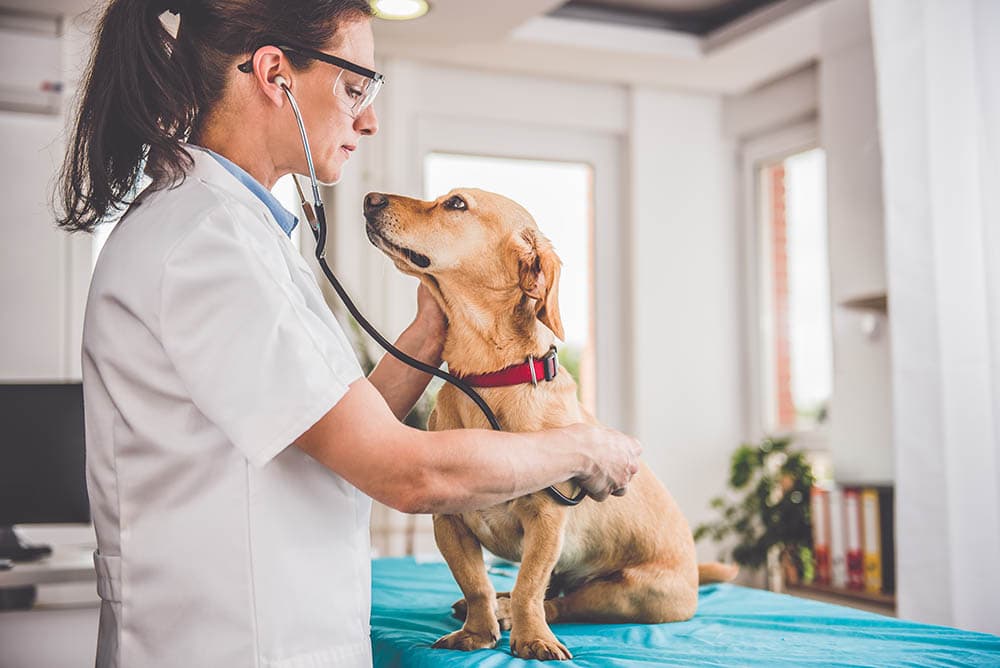
Whether your pet is suffering from a behavioral issue or medical problem, a thorough vet examination will ensure your pup receives the appropriate treatment. Your vet will run a series of tests to determine the cause of urinary incontinence, but it helps to report any observations about the condition. Some of the vital facts to relate include:
Top 6 Reasons for Urinary Incontinence in Dogs:
Detecting the cause of the urinary problem is essential for effective treatment and preventing more severe complications. Frequent leaks can cause damage to your dog’s skin from urine burns and can be a sign of illness.
1. Anxiety and Stress
Urinary problems occur more frequently with older pups, but puppies and adult dogs can experience urinary issues related to stress or anxiety. Unlike urinary incontinence, urinary retention occurs when a dog voluntarily resists peeing due to fear or stress.
Dogs suffering from separation anxiety after an extended family trip or pets moving to a new home can experience higher stress levels that lead to urinary problems.
Some dogs may feel more comfortable in their sleeping area when they’re stressed, but when they fall asleep, leakage can occur. Dogs usually love going outdoors, and a dog that seeks refuge in its bed instead of going for a walk requires a trip to the veterinarian for a complete examination.

2. Urinary Tract Infections
Older female dogs and dogs with diabetes or bladder stones are more susceptible to urinary tract infections (UTIs) than healthy adults. UTIs are caused by pathogenic bacteria, most commonly E. Coli, that enter the urethral opening.
Females are more prone to UTIs because they have shorter urethras than males. Besides peeing in their sleep, other signs that your pet has a UTI include bloody urine, peeing indoors, whimpering while peeing, and frequent licking around the genitals.
3. Hormone-Responsive Urinary Incontinence
Also called Urethral sphincter mechanism incompetence (USMI) or “spay incontinence,” hormone-responsive urinary incontinence is common as dogs age, especially spayed females. It occurs when estrogen levels decrease after spaying or with age, and the sphincter muscle surrounding the urethra weakens making it harder to hold the urine in the bladder.
Although spaying has many benefits such as reducing the risk of breast cancers, maintaining a stable population and reducing the risk of pyometra, it can result in a USMI in 4.9% to 20% of spayed canines (the higher risk being seen in bitches over 60 pounds, usually from large breeds). USMI may cause leakage during sleeping and when walking around. Incontinence can have other causes and is possible in both males and females.
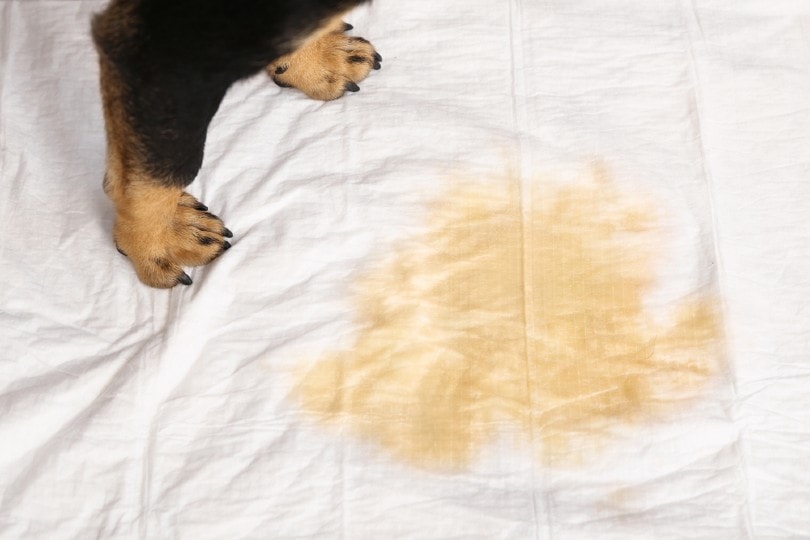
4. Anatomic Defects
An injury, surgery, or congenital disability can damage the bladder and lead to urinary incontinence. Birth defects include problems such as ectopic ureters. This condition occurs when ureters (tubes that carry urine from the kidneys to the bladder) are not in the correct anatomical position.
Unlike other causes of incontinence that can be identified by urinalysis, anatomic defects are diagnosed with x-rays, ultrasound and blood tests.
Other anatomic defects that can cause incontinence include urethral hypoplasia and perivulvar or vulvar conformation abnormalities. Although veterinarians can temporarily treat an anatomic issue with medication, most abnormalities will require surgery to correct and prevent further complications.
5. Neurological Problems
Brain diseases, lesions, and spinal cord injuries can also cause dogs to urinate in their sleep. Spinal cord injuries can damage the nerves controlling the bladder and cause fecal incontinence too. The bladder’s two main functions, voiding, and storage, can be impaired when a serious injury alters the dog’s sensations and voluntary control of urination.
Unfortunately, some neurological problems, such as lower lumbar lesions, can lead to permanent incontinence. Some owners are willing to care for wounded or aging dogs with neurological incontinence, but this decision should be made with the support of your vet.
6. Bladder Obstructions
Urinary retention caused by an obstruction is a life-threatening condition that demands immediate medical attention. Dogs suffering from urinary obstruction may exhibit difficulty urinating, weak or no urination streams, pain and straining to urinate. The back pressure that builds up from the blocked bladder damages the kidneys and the waste products that are usually removed from the body build up.
An untreated bladder obstruction can result in the death of a dog within a couple of days. Blockages in the bladder or urethra can be caused by blood clots, strictures, urethral plugs, bladder stones, or tumors.
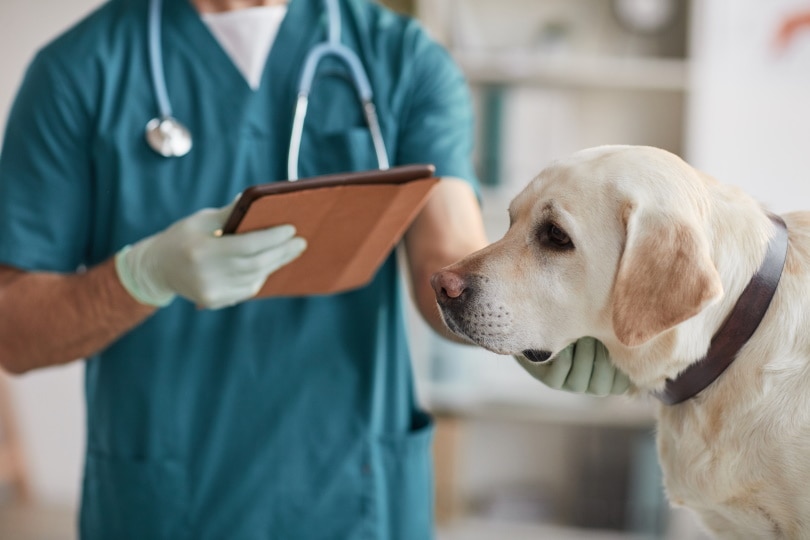
How To Care for Dogs Suffering from Incontinence
Since it may take a few weeks, depending on your dog’s diagnosis, for the animal to recover from leakage issues, you can make its life a little easier with these tips.
No matter how hard you try, pets will always leave you cleaning up smells, stains, vomit, hair, and everything in between. With the Hepper Advanced Bio-Enzyme Pet Stain & Odor Eliminator Spray, you can advance your clean-up routine!
- ADVANCED ENZYMATIC CLEANER - Penetrates the most stubborn smells and stains at the deepest molecular...
- FOR ANY MESS, ON ANY SURFACE - This pet odor eliminator cleans your carpets, floors, furniture,...
- FRESH, NATURAL ODOR - Our unique formulation doesn't rely on dangerous or unpleasant chemical...
It permanently removes the very worst pet stains and smells (and truly makes clean-up a breeze). Click here to learn more, order a bottle, and freshen up your home today.
At Pet Keen, we’ve admired Hepper for many years, and decided to take a controlling ownership interest so that we could benefit from the outstanding products of this cool cat company!
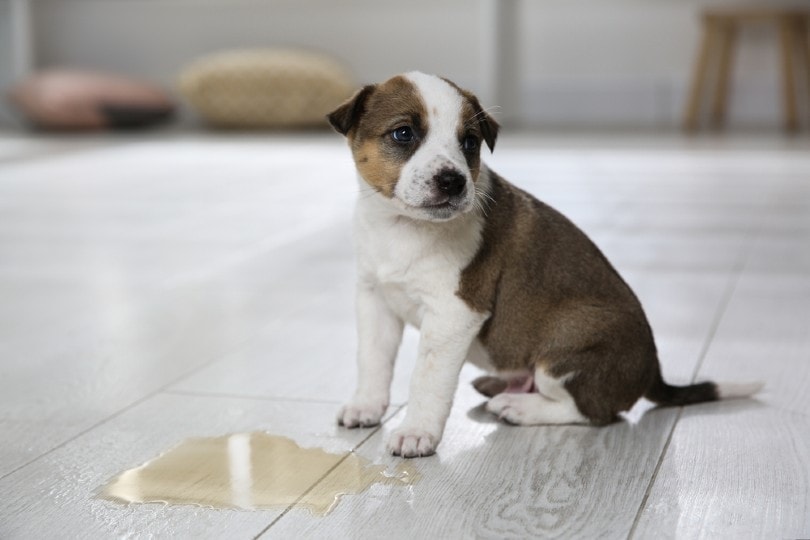
Which Breeds Are More Vulnerable to Urinary Problems?
Mature spayed females and dogs with diabetes are vulnerable to urinary infections and leakage. According to a urological study from 2008 in London, 30% of female dogs with urinary issues weigh over 45 pounds. Although all breeds can experience incontinence, it’s more prevalent with these breeds:
Conclusion
Canine incontinence can occur at any age, but it’s more common with aging pups and those experiencing medical issues. Uncontrolled leaking urine during sleeping hours can be the first clue that your dog needs some medical attention, and it’s important to take your pet to the veterinarian to diagnose the problem and treat it appropriately.
Although dogs may require surgery to correct the condition, most urinary issues can be treated with medications and prescription diets. Recovering from incontinence can take time, but you can modify your home to make the recovery process for your pet less stressful. Some causes of incontinence will require lifelong medications.
Featured Image Credit: Javier Brosch, Shutterstock









